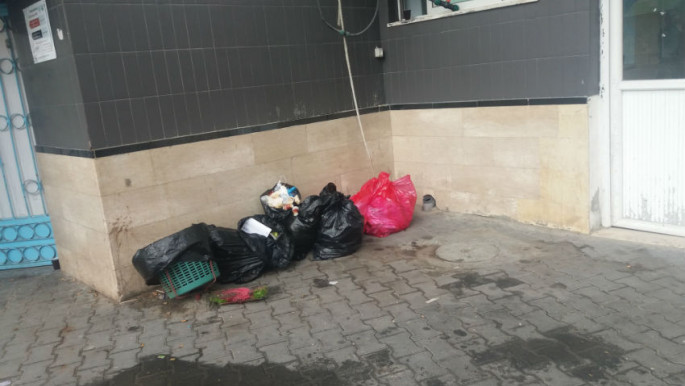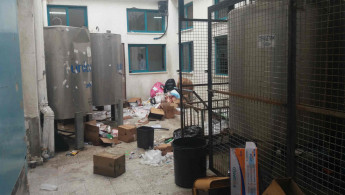Gaza's hospital cleaners become poverty-stricken pawns in politicised crisis
The workers walked out on February 4, insisting they should be paid by a private-sector cleaning company. The Al-Shifa hospital is the largest and oldest government-run hospital in Gaza and many of these cleaners have been staff here for years.
"I have been working here for the past 18 years and this time seems the worst for me and many other fellow workers," one striking worker told The New Arab. "Over the past five months, my seven children and husband have not had a staple meal on the table. We have been forced to sell out our sofa and refrigerator in order to be able to get by.
"I only get 700 shekels [$200] a month, which is already inadequate when it was paid," said Enaam Taweel, just outside the operating theatre she cleaned until two weeks ago.
As she continued to shed her tears, Enaam said her husband, who has some health complications, has been jobless and that she is the only provider for the seven children, the youngest of whom is seven-year-old Mohammad.
"During the past period of having been unpaid, my son Mohammad used to ask for one shekel [25 cents] to spend at school, but I have always been unable to give it to him. This has left a great deal of bitterness in my heart. Also, when me or one of my children happen to walk through the neighbourhood, we avoid showing up in front of a nearby grocer, to whom we now owe more than 1,500 shekels [$400].
"We have been relying on some food rations, provided by the United Nations Relief and Works Agency, every three months to many refugee folks like us."
 |
I prefer to come over here to my workplace, even when striking, from the early morning until late in the evening, just to avoid being asked for things by my family |  |
Another cleaner, 36-year-old Shadi Alkhaldi, a father of seven, has been striking alongside Enaam.
"This is the worst moment for me and my family. Over the past five months, I have been forced to borrow money over money from brothers, sisters, friends and local grocers," he said. "Now, in total, I owe them about 7,000 shekels [$2,000]. Can you imagine?"
Shadi is a cleaner in the abdominal diseases department.
"I prefer to come over here to my workplace, even when striking, from the early morning until late in the evening, just to avoid being asked for things by my family. My father, who is a retired school teacher, sometimes helps provide my children with some little food."
Demands
The Ameera cleaning company, which employs both Shadi and Enaam, is one of 13 private companies that are responsible for cleaning 13 hospitals and 20 other clinics run by the Palestinian Authority's health ministry.
 |
|
| Kidney dialysis patients sit among mounting medical waste in Al-Shifa hospital [Rami Almeghari] |
"We are being unable even to pay for cleaning items like plastic packs, tissue paper or soup and thus we have been forced to provide our own cleaning equipment," said Abdallah Ameera, owner of the Ameera cleaning company.
"In November of last year, the Ramallah-based Palestinian Health Ministry was able to refund us with one-month's expenses of 120,000 shekels [$32,000].
"But since then, we have not been refunded. Our contract with the health ministry states clearly that we take care of cleaning, in return for refunding. For September and October months of last year, neither the Gaza-based or the Ramallah-based governments have refunded us."
When Abdallah contacted the health ministry in Ramallah, they were promised funding, but none has arrived - and they have been unable to resume their work.
At the Al-Shifa hospital compound, medics declared 800 surgeries would be suspended last week, due to the lack of cleaning throughout the hospital. Officials are understandably afraid of contamination.
Meanwhile, small groups of volunteers, sent by local mosques or large Gaza families, have come over to clean the hospital. However, garbage is still clearly seen, throughout the various departments.
A politicised problem
In November 2017, a consensus Palestinian government in Ramallah began taking responsibility for Gaza's various ministries, including the health ministry. This came in the wake of a unity deal, signed between the ruling Hamas party in Gaza and the Fatah party of Palestinian President Mahmoud Abbas in the West Bank.
The Cairo-mediated deal stipulated that Hamas should hand over responsibilities to the Palestinian consensus government.
As the government-run hospitals' cleaning crisis grew, Osama Alnajjar, the spokesperson for the Palestinian Health Ministry in Ramallah, was quoted as saying that his ministry could not refund private cleaning companies until the Gaza-based authorities enabled the consensus government to take full responsibility for Gaza - including revenue collection.
 |
|
| Gaza's Al-Shifa hospital was forced to suspend more than 800 surgeries last week as the cleaning crisis spirals out of control [Rami Almeghari] |
Gaza-based health officials deny such allegations and insist that the health ministry in Ramallah should be in charge of all running costs for government-run hospitals and clinics, across the coastal territory.
Before the cleaning crisis, Gaza health officials had demanded fuel for power generators for government-run medical premises in times of blackouts, warning of faltering basic health services at key hospitals.
The Ramallah-based health ministry rejected those warnings and insisted that Hamas in Gaza, under siege by Israel since 2007, should take responsibility for running costs.
"Some nurses at the department where I clean promptly helped me with few shekels when they receive their monthly salaries," said Enaam. "I do not want to turn into a beggar, I want my salary back, before I start begging from others.
Rami Almeghari is a freelance Palestinian journalist living and working in Gaza.
Follow him on Twitter: @writeralmeghari



